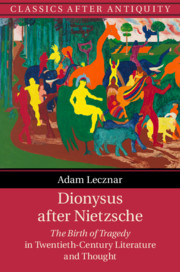
-
Select format
-
- Publisher:
- Cambridge University Press
- Publication date:
- March 2020
- April 2020
- ISBN:
- 9781108696890
- 9781108482561
- 9781108710671
- Dimensions:
- (228 x 152 mm)
- Weight & Pages:
- 0.48kg, 256 Pages
- Dimensions:
- (229 x 152 mm)
- Weight & Pages:
- 0.381kg, 260 Pages
You may already have access via personal or institutional login
Book description
Dionysus after Nietzsche examines the way that The Birth of Tragedy (1872) by Friedrich Nietzsche irrevocably influenced twentieth-century literature and thought. Adam Lecznar argues that Nietzsche's Dionysus became a symbol of the irrational forces of culture that cannot be contained, and explores the presence of Nietzsche's Greeks in the diverse writings of Jane Harrison, D. H. Lawrence, Martin Heidegger, Richard Schechner and Wole Soyinka (amongst others). From Jane Harrison's controversial ideas about Greek religion in an anthropological modernity, to Wole Soyinka's reimagining of a postcolonial genre of tragedy, each of the writers under discussion used the Nietzschean vision of Greece to develop subversive discourses of temporality, identity, history and classicism. In this way, they all took up Nietzsche's call to disrupt pre-existing discourses of classical meaning and create new modes of thinking about the Classics that speak to the immediate concerns of the present.
Reviews
‘L.’s volume is a rare book because of the excellence of his ideas and the quality of research and writing. It masterfully shows how our life is shaped by modernity’s appropriation of an ancient Greek heritage … The scholarship is stellar throughout … The book enters as a sharp-sighted contribution into the field of literature on modernity and its relationship to the ancient Greeks.’
Marina Marren Source: The Classical Review
‘The scholarly rigour of Dionysus after Nietzsche, and the painstaking research evidenced throughout, mark it out as a vital addition to existing work on the interactions between ancient and modern literature. This book will be of keen interest to all students and researchers of classical reception, especially tragedy, as well as those of modern literature, philosophy, and social theory, in addition to the interested general reader.’
Samuel Agbamu Source: Rhea Classical Reviews
Contents
Metrics
Altmetric attention score
Full text views
Full text views help Loading metrics...
Loading metrics...
* Views captured on Cambridge Core between #date#. This data will be updated every 24 hours.
Usage data cannot currently be displayed.
Accessibility standard: Unknown
Why this information is here
This section outlines the accessibility features of this content - including support for screen readers, full keyboard navigation and high-contrast display options. This may not be relevant for you.
Accessibility Information
Accessibility compliance for the PDF of this book is currently unknown and may be updated in the future.


